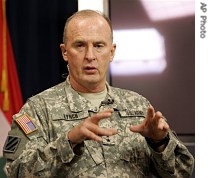2007年VOA标准英语-Another US General Calls for More Time in Iraq(在线收听)
Pentagon
06 July 2007
Amid growing pressure from the congress for the start of a U.S. withdrawal from Iraq this year, a senior U.S. commander in Iraq is warning that a premature withdrawal would create, in his words, "a mess." VOA's Al Pessin reports from the Pentagon the commander is the latest in a series of senior officers to issue such a warning.
 |
| US Major General Rick Lynch briefs the media during a a press conference in the heavily fortified Green Zone in Baghdad, Iraq, 24 June 2007 |
The latest to speak, on Friday, was Major General Rick Lynch, commander of coalition forces south of Baghdad.
"We need these surge forces. They came in for a reason," he said. "They're being used for the reason they came in. It's going to take some time to mature the situation. Over time we can turn the area over to Iraqi security forces and then we'll be ready to do something that looks like a withdrawal, but that's not going to happen any time soon."
General Lynch says if congress forces the start of a withdrawal before Iraqi forces are ready to take over, insurgents will move back into areas his forces now control, and will resume their activities in support of insurgents in Baghdad.
"It'd be a mess," he added. "Those surge forces are giving us the capability we have now to take the fight to the enemy. And the enemy only responds to force, and we now have that force. If those surge forces go away, that capability goes away, and the Iraqi security forces aren't ready yet to do that. So now, what you're going to find if you did that is you'd find the enemy regaining ground, reestablishing sanctuary, building more IEDs [Improvised Explosive Devices], carrying those IEDs into Baghdad and the violence would escalate. It'd be a mess."
Speaking via satellite from a base in Iraq, Major General Lynch said since the current operation began three weeks ago, his forces have cleared insurgent sanctuaries, found more than 40 weapons caches and more than 50 homemade bombs, and cleared and secured more than 1,000 buildings. He reports 50 insurgents have been killed and 230 captured, some of them senior leaders.
"That indeed is going to have an effect on the security situation in Baghdad," he said. "The problem is, you're not going to see an instantaneous, measurable effect. It's going to take a while."
But General Lynch said his forces have still not moved into about 30 percent of the four-province area where he is responsible. He says there are not enough capable Iraqi forces to move in behind U.S. troops and maintain security so his forces can move into the remaining areas. But he says the situation is improving.
And while he would not predict when it might be safe to begin withdrawing U.S. forces, he indicated most of the serious fighting should be finished by about the time the eagerly anticipated September report to the congress is due.
"I see these aggressive offensive operations taking us through July, August and into September," he noted. "But by then, based on our calculations, we will have denied the enemy those sanctuaries and we can transition into the hold and retain phase in those sanctuaries."
In recent weeks, other senior commanders have also warned against a premature U.S. withdrawal from Iraq. Ten days ago, the general who was in charge of training Iraqi forces warned against drawing down U.S. forces too quickly in the wake of preliminary successes. And just a few days before that, the number two U.S. commander, Lieutenant General Ray Odierno, said it could be next spring before Iraqi forces are ready to take over from the coalition.
The statements place the generals uncharacteristically at odds with several leading Republican members of the Senate, who have declared the new security strategy a failure. Some of them have joined Democrats in calling for the start of a U.S. withdrawal from Iraq before the end of the year.